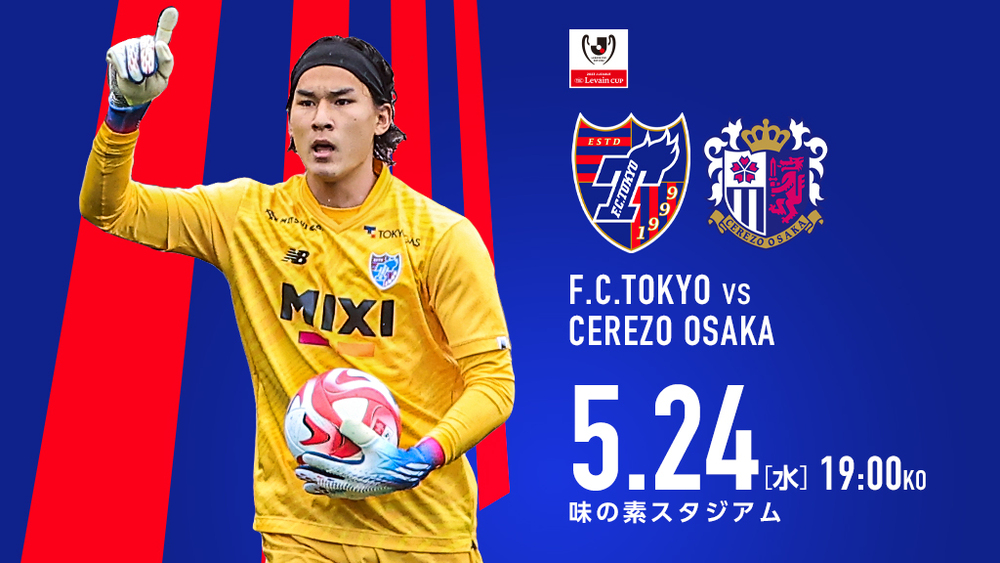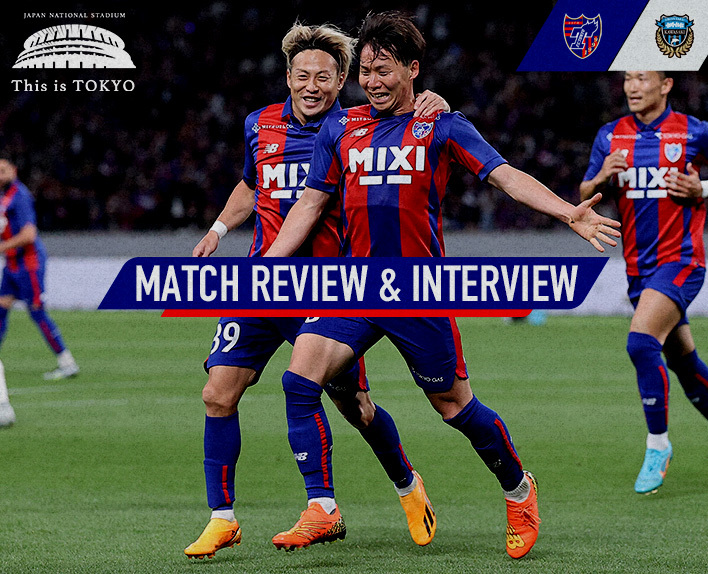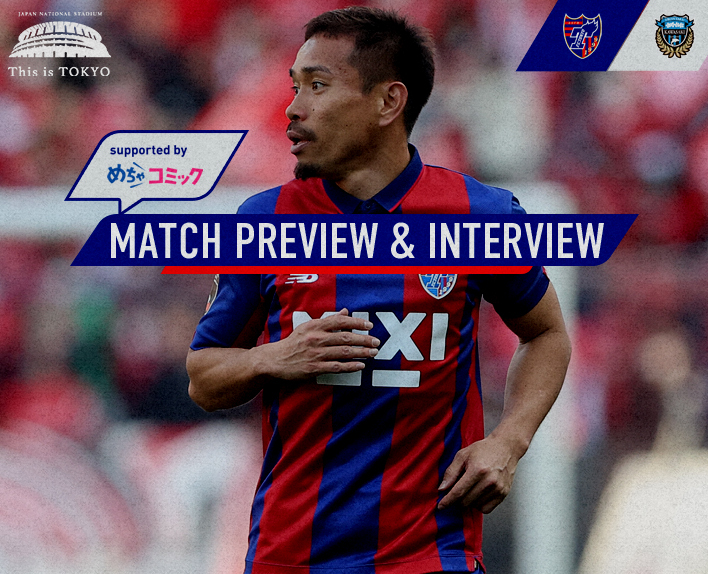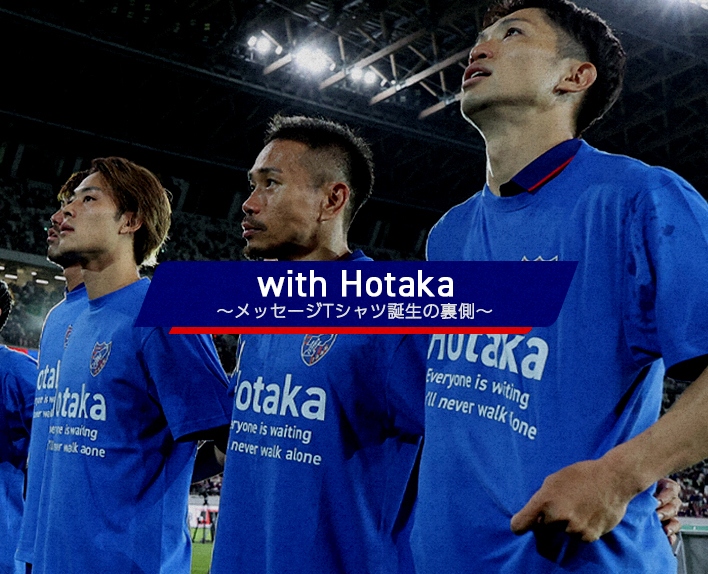<Match Review>
It was a big match with pride and determination. The stadium, which was attended by a record-breaking 56,705 spectators in the club's history, created an amazing atmosphere. FC Tokyo, who were on a two-game losing streak, had Yuto Nagatomo, Yasuki Kimoto, Yuhei Tokumoto, and Keigo Higashi in the starting lineup. Up front, they had Teruhito Nakagawa, Ryoma Watanabe, and Diego Oliveira, as they aimed for a victory against Kawasaki Frontale at the home Japan National Stadium, their arch-rivals, after 10 games.
1st HALF - Leading with 1 goal and 1 assist from Tokumoto
As the loud cheers of both teams' fans and supporters filled the air before the start of the match, Kawasaki kicked off to begin the first half. Unlike the previous two matches where they suffered consecutive defeats, Tokyo showed a composed start to the game. Instead of pressuring Kawasaki's build-up play from the front, they adopted a defensive approach of observing the situation to some extent. There were a couple of moments in the early stages where left fullback Torisawa was left free to receive a diagonal pass, creating a dangerous situation. However, they managed to withstand that scene and gradually gained control of the game. And in the 12th minute of the first half, a superb goal erupted throughout the stadium.
In the middle of the game, East player with the ball expands to the right side. Nagatomo's cross does not meet the player in the center and flows to the far side, but Tokumoto player picks it up and dodges the opponent with a deep cutback, flashing his right foot, which is his non-dominant foot. The powerful shot pierces through the side net.
Furthermore, in the 25th minute of the first half, they scored an eagerly awaited additional goal from a brilliant flow. Diego passed to Tokumoto, who had stolen and kept the ball in front of the area while running up the left side. Shuto ABE jumped and pushed the ball into the goal from Tokumoto's ground cross.
The game continued at a complete Tokyo pace, and they quickly and fiercely took the ball from the opponent's defense in the midfield, maintaining control and not giving the opponent a chance. However, once Kawasaki started to regain their rhythm, they began creating scenes that ended with shots.
In the 37th minute of the first half, Yakub Slowik, the player, managed to fend off a decisive pinch with a super save, but in the 39th minute, just two minutes later, Miyashiro, the player, finally broke through and scored. However, Tokyo, who managed to regroup in the remaining time, ended the first half with a one-point lead. They spent a promising 45 minutes and headed to the locker room.
2ndHALF—Maintaining the lead, victory in the Tama River Clasico
In the second half, a play that will determine the flow of the game will occur at an early stage. From the set play, Nakagawa picks up the ball and Wakizaka tackles late. With the support of VAR, a foul is called and Wakizaka is sent off, putting Tokyo in a numerical advantage. And in the 9th minute of the second half, they create a big chance. They connect and break on the right side, and Koizumi Kei crosses for Watanabe to take a shot, but unfortunately it hits the crossbar.
However, even with one less player, Kawasaki did not lose their attacking power and continued to push forward. They sent players like Kobayashi and Oshima onto the pitch and increased the number of players in the front line. As space began to open up in the midfield, they were able to utilize their individual high skills to threaten the goal. In the 33rd minute of the second half, Tonno broke free from a single feed and took a shot after a perfect chest trap, but once again, Swobik made a fine save. They managed to escape the danger somehow.
As the remaining time became short, Tokyo also showed a decisive response. They successively brought in Koki Tsukagawa, who will face his former team, and Kashif BANGNAGANDE, maintaining the balance and intensity of the defense on the sides. And they managed to advance the time well, entering the 6 minutes of additional time.
Captain Masato MORISHIGE's body-clearing and other efforts, he defended until the end without losing concentration. As the cheers and applause from fans and supporters filled the air, the clock reached the 53rd minute of the second half and the final whistle blew. The whistle announcing Kawasaki's first victory in 5 seasons sounded, and the stadium was filled with joy, especially in the home goal section.
Tokyo, who stopped their losing streak in the best way possible, shared the joy of victory with the fans and supporters who believed in their win and rushed to the stadium, resonating the "City That Never Sleeps" for the first time at the renovated Japan National Stadium. They extended their winning streak in official matches at the Japan National Stadium to "4", and blue and red smiles burst everywhere.
MATCH DETAILS
<FC Tokyo>
STARTING XI
GK Jakub SLOWIK
DF Yuto NAGATOMO / Yasuki KIMOTO / Masato MORISHIGE / Shuhei TOKUMOTO
MF Kei KOIZUMI / Keigo HIGASHI / Shuto ABE
FW Ryoma WATANABE (28th minute of the second half: Koki TSUKAGAWA) / Diego OLIVEIRA (15th minute of the second half: Adailton) / Teruhito NAKAGAWA (43rd minute of the second half: Kashif BANGNAGANDE)
SUBS
GK Taishi Brandon NOZAWA
DF Henrique TREVISAN
FW PEROTTI/Kota TAWARATSUMIDA
GOAL
First half 12 minutes: Shuhei TOKUMOTO/First half 25 minutes: Shuto ABE
<Kawasaki Frontale>
STARTING Ⅺ
GK Naoto KAMIFUKUMOTO
DF Miki YAMANE/Takuma OMINAMI (45+7th min: Kazuya YAMAMURA)/Shintaro KURUMAYA/Kyohei NOBORIZATO
MF Joao SCHMIDT (37th min: Shin YAMADA)/Tatsuki SEKO (14th min: Ryota OSHIMA)/Yasuto WAKIZAKA
FW Akihiro IENAGA (30th min: Kento TACHIBANADA)/MARCINHO (14th min: Daiya TONO)/Taisei MIYASHIRO (30th min: Yu KOBAYASHI)
SUBS
GK Sung Ryong JUNG
GOAL
First Half 39th Minute: Taisei MIYASHIRO
[Coach Albert PUIG ORTONEDA Press Conference Comments]
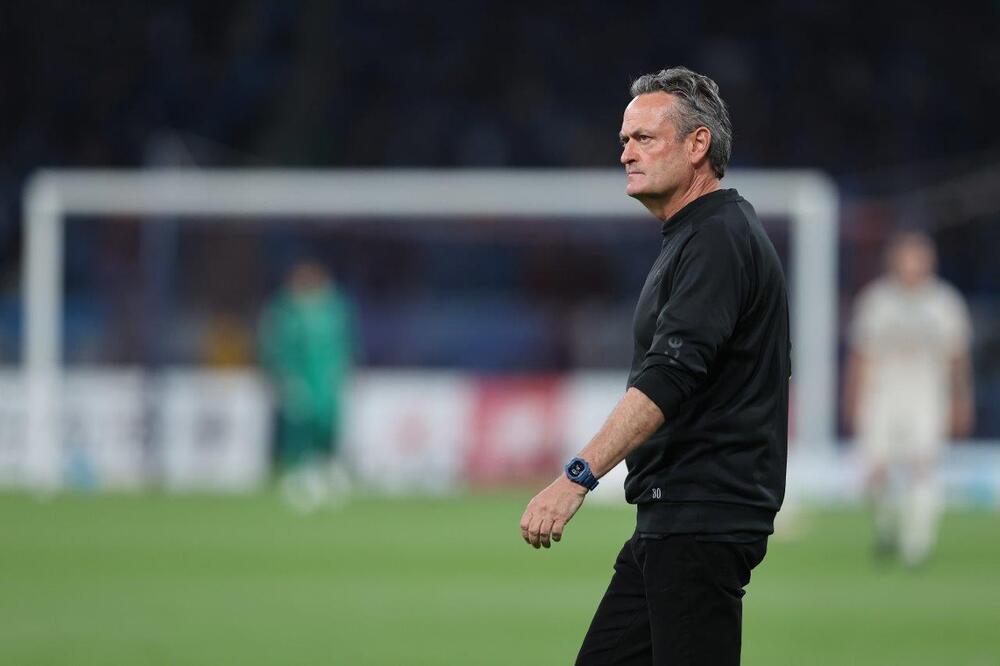
Q: please review the game.
A, for us, the Japan National Stadium is like a place under a spell. We had a great rival in front of us. I think this wonderful atmosphere pushed us forward to fight against them. I think we dominated the game in the first 30 minutes. It was a 4-3-3 vs 4-3-3 matchup. We were able to defend well against Kawasaki's dangerous attacks, which are attacking from the sides with numbers or utilizing the quick counter-attacks with Marcinho. Our press was working well, and when we had the ball, we had a strong awareness of attacking towards the opponent's goal and were able to play offensively. We didn't make many mistakes in the first half. However, Kawasaki scored from a few mistakes. I think it proved that Kawasaki has great goal scorers.
I thought we had a good start in the second half. We also had chances to hit the post. We had a player sent off, which was a plus for us, but it wasn't easy to play against a team with one less player. After Kawasaki had one player sent off, they divided into two groups, the defense and the forward line, and they first broke our press in the forward line and distributed the ball to the forward line. I think they also created decisive chances. To neutralize their effective play, we lowered our defensive block a little and adopted a waiting approach in defense. After that, we were able to make good adjustments and their chances did not lead to decisive chances like long shots.
For the past four years, we have suffered seven consecutive losses to Kawasaki. In the midst of that trend, it was very difficult to achieve a victory against them, and I think it was a very valuable thing. I would like to dedicate this victory to Hotaka NAKAMURA. I did not mention their names, but I also want to dedicate it to the other two players.
Q: What role did you give to Ryoma WATANABE?
A, it is important to have an advantage in the center against opponents who play clearly in a 4-3-3 formation like Kawasaki, and against opponents who place wingers and a center forward. Therefore, my initial position was on the left wing, but during attacks, I would drift towards the center to create a numerical advantage of 4 against 3. Against opponents who build their midfield in a reverse triangle formation in a 4-3-3, the space next to the lone defensive midfielder becomes an effective space for attacking. I assigned the task of exploiting that space to player Watanabe and player Shuto ABE.
Q: What was the reason for returning to the familiar form of last season, including system and pass direction?
A, I think soccer is a sport that is influenced by the recent match results and memories of the game. For example, please remember the opening match of last season, the away game against Kawasaki. I think the quality of the team's play was completely different between that match and today's match. We were able to achieve victory in the opening match of this season against Urawa Reds in a good shape. However, many injuries occurred afterwards. When several injured players returned, we were able to achieve victories against Gamba Osaka, Sanfrecce Hiroshima, and Albirex Niigata. However, I think the second half of the Avispa Fukuoka match and the first half of the Hokkaido Consadole Sapporo match afterwards were very poor in terms of content.
What I want to say is that Tokyo has continued to grow over the past year and a few months. There is a clear growth compared to the beginning of last season. I hope you understand that. We are still in the growth stage. It is also true that we have not yet reached a level where we can play consistently well. We are in the midst of the growth process. This change in style is very significant. Many players were part of this club two years ago. We must not forget that we are working on this style change while utilizing them. That is the fact and the reality. Sooner or later, the reality of losing matches will come. We may rise again and achieve victory. Things went well today, but there will be days when they do not. Kawasaki can be said to be a mature team in the sense that they have been playing in their current style for a long time. They continue to uphold their style regardless of winning or losing. On the other hand, we have only been working on our current style for a little over a year. That is the reality, and when we lose matches, we are criticized, and when we win, we rejoice. I believe that the joys and sorrows are part of football.
[Player Interview]
<Masato MORISHIGE>
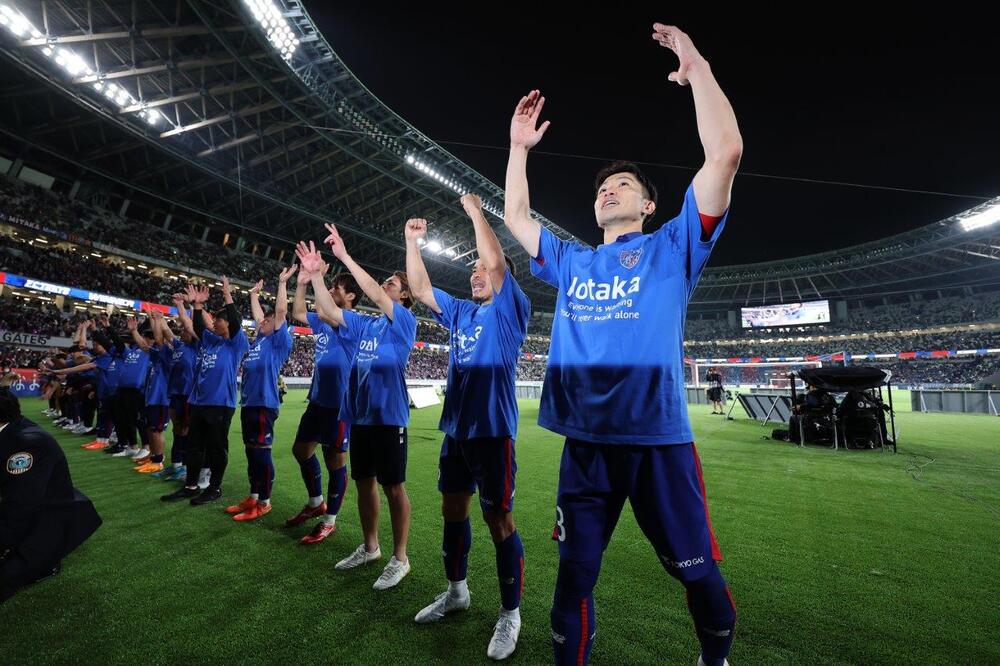
Q: please review the game.
I am most happy that we won, and there is an indescribable joy.
Q, there were also moments after the end of the match where it seemed like the emotions of the past overflowed.
A, I have been feeling frustrated up until now. I really wanted the team to win today's match no matter what, and this victory has become a way for us to regain the feeling of fighting together after a week of everyone's worries and struggles.
Q: What do you think about the victory against Kawasaki Frontale in the league match, which is the first time since the 2018 season?
A, this victory gave us a lot of courage. There were times when we were worried about how to fight as a team, but today the players who stood on the pitch were determined in a good way, focused on the game, and were able to earn 3 points. I think it is also meaningful that we were able to win at the Japan National Stadium, where many of you came to see.
Q: Please once again explain the importance of winning in the long-standing "Tama River Clasico".
A, as a member of Tokyo, I have fought in the Tama River Clasico many times and have had many frustrating experiences. Therefore, I am truly happy to have achieved victory on a stage like today.
Q, please tell us about the difference in the team atmosphere that player Morishige felt before and after the match.
Before the match, we had prepared as a team and organized what we had discussed. All we had to do was fight together. The players on the field were able to fight with courage. I realized that we can share joy with everyone as much as we have suffered together.
<Jakub SLOWIK>
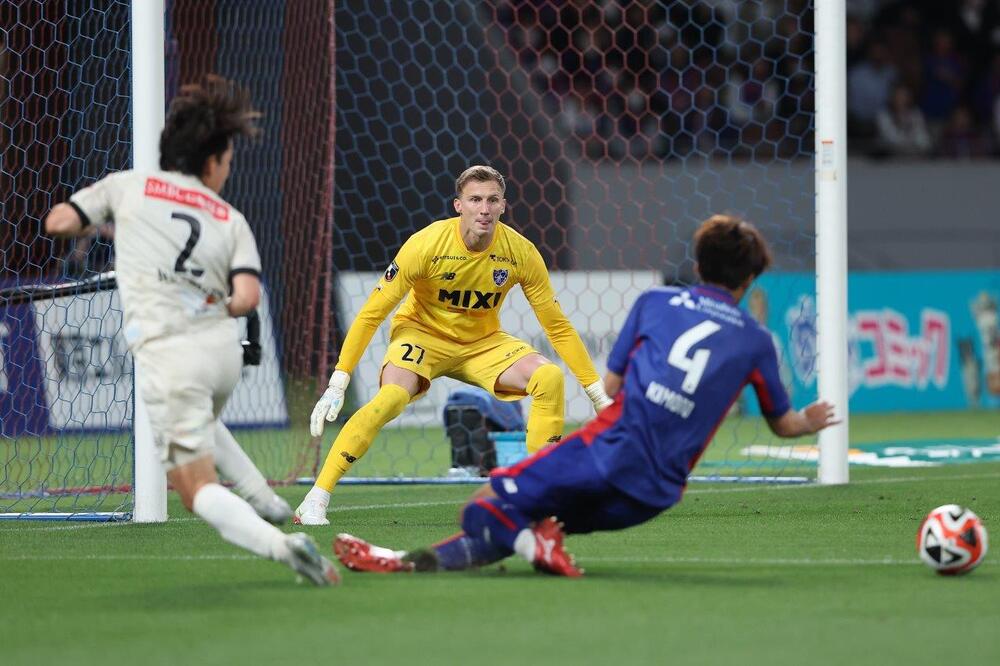
Q, congratulations on your victory.
A, I think it was a big victory. It was very important for the team to win today. I think it was a very important victory for this Tokyo Family because we were able to win for Hotaka NAKAMURA, who suffered a serious injury.
Q, I think it was a difficult situation as we were on a losing streak in the league matches. What did you consider important?
A, although we haven't been winning recently, I believe that the team coming together and fighting together led to today's victory. I hope that we can strengthen our unity and use today's victory as a starting point to gradually improve in every match.
Q, it was a match with many fans and supporters in attendance.
Not only me, but all the players were really happy with the atmosphere of this stadium. I am very proud of the atmosphere created by the fans and supporters who built this stadium.
<Shuhei TOKUMOTO>
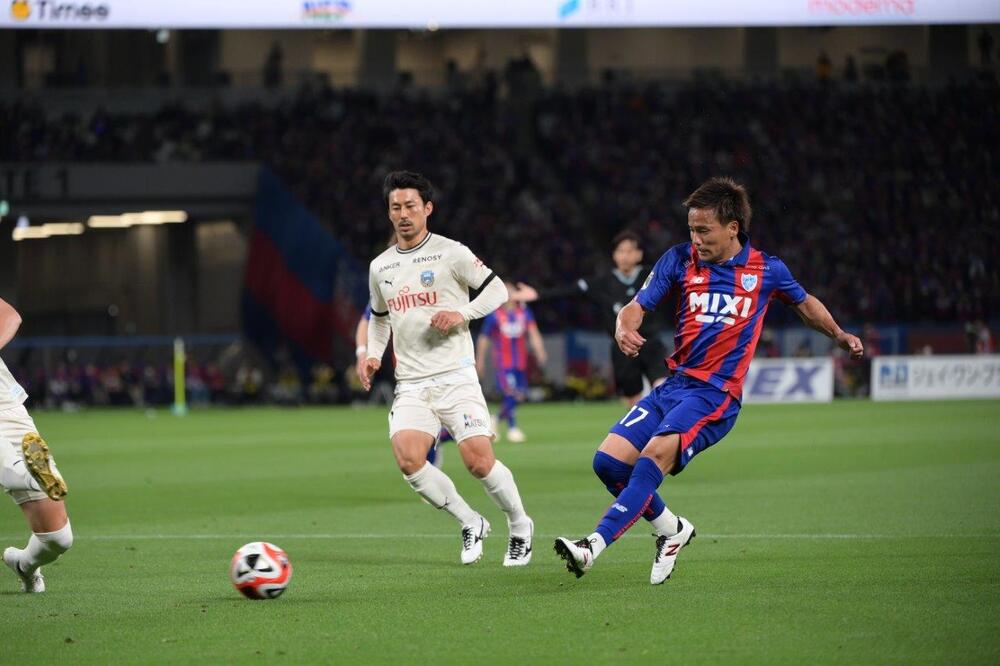
Q, how do you look back on the goal scene?
A, I think that not putting too much power into it and focusing on the impact by swinging with the opposite foot, led to the goal.
Q: Were you aiming to cut back and shoot with your right foot?
At the point of turning around, I thought there was no cross, and since it is the Japan National Stadium, I swung with the feeling of daring to shoot.
Q, I think it was the team's first shot.
A, I thought it was necessary to shoot more and I'm glad I was able to create a good flow.
Q, how did you feel when you scored the goal?
A, I didn't know how to be happy, but all the fans and supporters stood up and cheered for me, so I was really happy.
Q: What are your thoughts on scoring your first goal in J1 on such a big stage?
A, it is very deep emotion. Last season, I was on the side of watching the games at the National Stadium, but since yesterday, I have been feeling fluffy, so to speak, and I felt like I could do something. I think I was able to give courage and hope to J3 and J2 players.
Q, how many times have games been held at the Japan National Stadium?
A, it's my first experience. Since the opening ceremony of the National High School Soccer Championship. I've always wanted to stand on this stage and play. I think playing here is a dream for high school soccer players, so I was happy to become a professional and have a game at home. It was a good day.
Q: During the hero interview, you waved your hand to your grandmother. Is there any reason for that?
A, Grandpa, Grandma, I always wanted to express my gratitude if I had the opportunity to do a hero interview someday. During the January camp, my grandpa, who guided me into the path of soccer, passed away, so my grandma and I raised me like parents. With gratitude, I said "I scored a goal" towards the sky, and I was able to say "I did it!" to my grandma who supports me from behind the TV.
Q, have you not had any communication with your grandmother yet?
A, not yet. Since I just arrived here, I would like to contact you later.
<Shuto ABE>
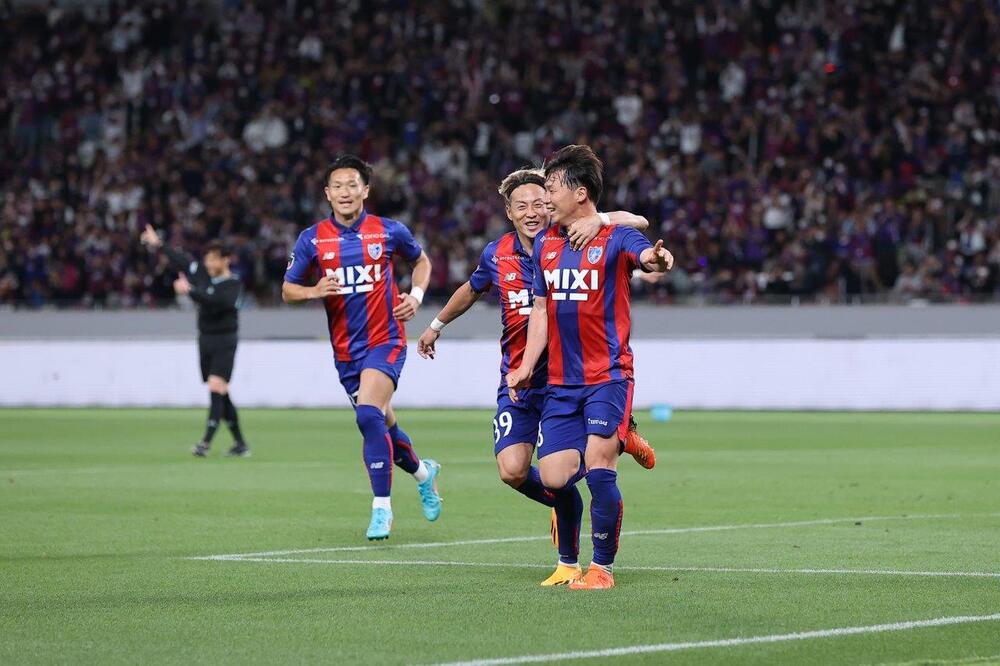
Q: How do you feel about the victory in the Tama River Clasico?
A, I am really happy to have won at this amazing Japan National Stadium.
Q: What were you conscious of from the previous match against Hokkaido Consadole Sapporo?
A, at this week's player meeting, I first talked about expressing the fundamental aspect of "fighting" in soccer, so I think we were able to have a good defense from the beginning of the game by being conscious of that.
Q, I thought the defense was working well together, what are your thoughts on the progress?
Whether we were pressing high or defending deep, we were able to win the ball. I think we were able to play with the mindset that it's okay even if the opponent has possession of the ball.
Q, please review the goal scene.
A, the short counter is also a strength of Tokyo. I think Shuhei TOKUMOTO was watching me well. I was able to run into a good position, so all I had to do was touch it in the end. I think it was a good goal.
Q, it was a play as if playing in the top position.
I played as an inside half, but I couldn't score unless I showed my face in front of the goal, so I ran into the goal area and it was good that a good ball came.
Q: After the match, Hotaka NAKAMURA was wearing the number 2 shirt.
A, we were talking about winning for sure and everyone wearing Hoko's shirt. Hoko also feels frustrated, so it was good to be able to earn 3 points with good plays while carrying such feelings.
Q, how did it feel to have your name called at the Japan National Stadium?
It is a great honor to score and have the fans and supporters call my name among a crowd of over 50,000. I want to continue to perform well and make my name known even more.
<Teruhito NAKAGAWA>
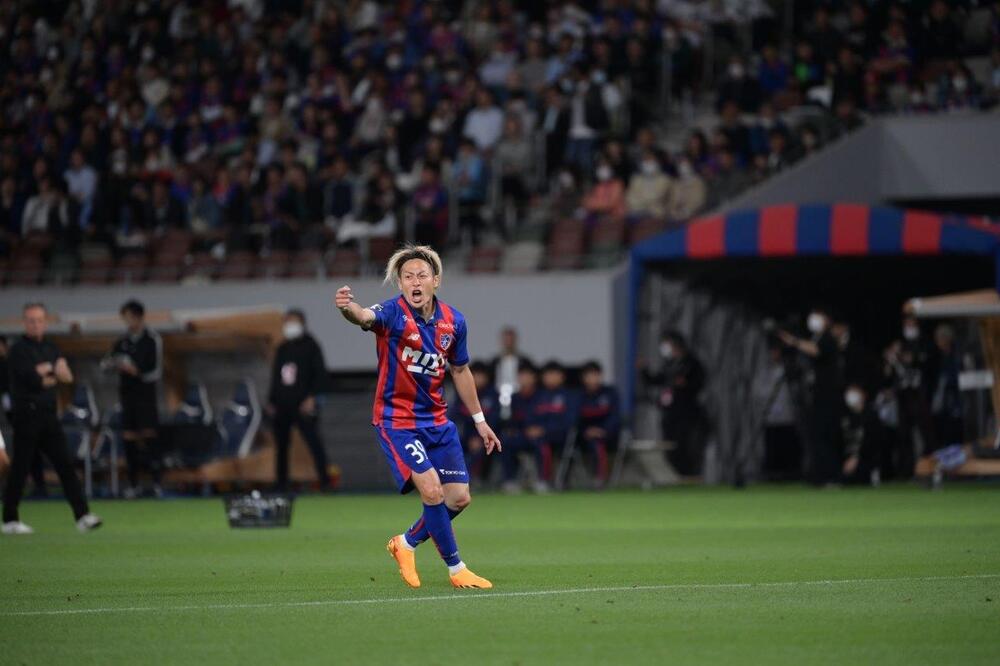
Q: Please tell us your thoughts on the first Tamagawa Clasico, even though you have played against Kawasaki multiple times at your previous club.
A, I felt a different atmosphere and intensity in the Kanagawa Derby and Tamagawa Clasico in Tokyo when I was playing for Yokohama F.Marinos. We had lost two games in a row, so we tried to regain the gritty and intense qualities that we had valued and persevered with, and I believe that our strong determination to see it through led to victory.
Q: Was the desire to win the Tama River Clasico shared within the team after two consecutive losses?
A, yes. I thought that stopping the losing streak in a good environment against a good opponent would be an opportunity to regain confidence. Everyone was motivated, and I think we were able to surpass them in details such as the basics.
Q, I got the impression that you were dribbling more than usual.
A, there weren't many opportunities to create chances with the ball, but I was conscious of the forward propulsion when it became my ball and prolonging the time with my ball. I knew Kawasaki was a team that controlled the ball, so I thought it was important for us to create as much time as possible with the ball.
Q: There were many scenes where Ryoma WATANABE and the position were swapped from the beginning. Did you discuss it beforehand?
A, I'm playing freely. Both Watanabe TSUBASA and myself were playing freely and fluidly.
Q, please tell us the points where you think the defense went well.
A, in the past few games, we have been using long balls in the first 15 minutes to avoid the opponent's high press. From there, we have been able to connect when we have possession of the ball, so of course it is ideal to connect and break down from the beginning, but there are also some parts where we have to compromise. Kawasaki players have high technical skills and the ability to create chances with the quality of their passes, so I think that is an area that we need to work on and improve.
